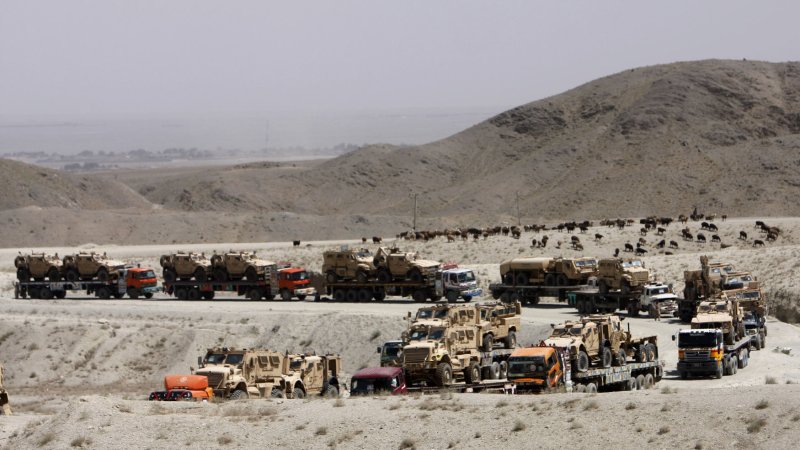1 of 2 | Pakistani trucks carrying NATO and U.S military vehicles cross the Quetta Chaman highway at Kojak Pass border area after leaving the southern Afghanistan province of Kandahar near Chaman, Pakistan on July 25, 2013. The trucks head to the port of Karachi, Pakistan as the pullout continues, ending a NATO/USA decade-long military combat involvement in Afghanistan by the end of 2014. There are approximately 60,000 American troops in Afghanistan at present. UPI/Matiullah Achakzai |
License Photo
WASHINGTON, Aug. 1 (UPI) -- Washington and Kabul are close to reaching a bilateral security agreement on the U.S. military presence in Afghanistan after next year, source told USA Today.
The source, identified as a senior U.S. State Department official familiar with the negotiations, said the two countries have resolved most of the issues relating to post-2014 U.S. presence to include a limited U.S. counter-terrorism force and military advisers, the newspaper said.
"We're at the point now where we concluded the text. We're in a period of endgame," the source said.
The report said issues resolved include acceptance of the Pentagon's condition that only the United States will have legal jurisdiction over its troops in Afghanistan and not the local courts.
Without a bilateral security agreement, a U.S. military presence will not be possible after 2014, when the withdrawal of all foreign troops are scheduled to be completed with Afghan security forces taking over all responsibilities for Afghanistan's security.
The U.S.-Afghanistan agreement, however, must be approved by Afghan President Hamid Karzai, who in the past had been difficult to deal with over the issue.
"Just waiting on Karzai could be a long wait," Michael O'Hanlon at the Brookings Institution think tank told USA Today.
During the negotiations, the Afghans, expressing concerns about interference from neighboring Pakistan, had sought U.S. security guarantees, saying the Afghan military is not equipped with fighter aircraft and other equipment to defend its borders, Said Jawad, former Afghanistan ambassador to the United States, told the newspaper. The Afghans also reportedly wanted assurances of financial support included in the agreement.
However, the State Department source was quoted as saying the United States could not include such guarantees in the document, but that its officials had tried to address the concerns in discussions with Afghans.
The U.S. official also said Karzai had been consulted each step of the way.
The report said the agreement only calls for the residual force to assist Afghan security forces and establishing a U.S. counter-terrorism force limited to pursuing al-Qaeda and its affiliates.
"We're not suggesting under any of the conceivable scenarios that we will have a (counter-terrorism) force in the country large enough to go after the Taliban," the State Department official said. "We're no longer seeking out the Taliban. That's the responsibility of the Afghan national security forces."















